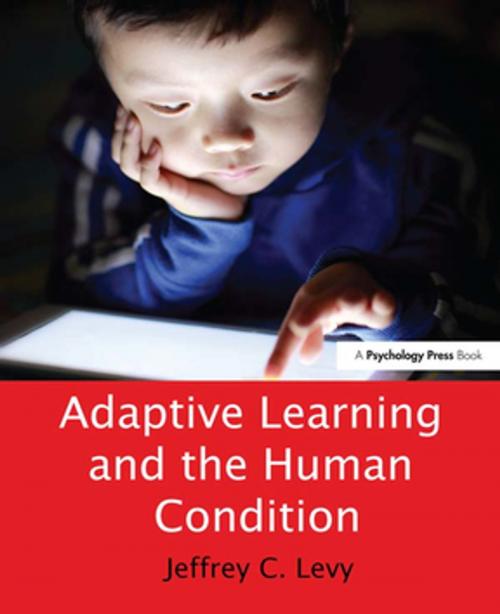Adaptive Learning and the Human Condition
Nonfiction, Health & Well Being, Psychology, Experimental Psychology, Reference & Language, Education & Teaching, Educational Theory, Educational Psychology, Cognitive Psychology| Author: | Jeffrey C. Levy | ISBN: | 9781317351283 |
| Publisher: | Taylor and Francis | Publication: | October 30, 2015 |
| Imprint: | Routledge | Language: | English |
| Author: | Jeffrey C. Levy |
| ISBN: | 9781317351283 |
| Publisher: | Taylor and Francis |
| Publication: | October 30, 2015 |
| Imprint: | Routledge |
| Language: | English |
Adaptive Learning and the Human Condition presents the basic principles of classical (Pavlovian) and instrumental (Skinnerian) conditioning in a more coherent and expansive manner than is the case in other textbooks. Learning is defined as an adaptive process through which individuals acquire the ability to predict, and where possible, control the environment. This overarching definition enables integration of traditional Pavlovian and Skinnerian principles and terminology and makes explicit why treatment of the learning process is essentially limited to these two historical research paradigms. Pavlov developed a methodology for studying animals under circumstances where they could predict, but not control, sequences of environmental events. Skinner studied animals under circumstances where their behavior had an effect upon environmental events. Observational learning and symbolic communication (i.e., spoken or written language) are incorporated as indirect learning processes through which individuals can acquire the ability to predict or control. This treatment creates a perspective within which it is possible to consider the fundamental nature of the learning process in understanding the human condition and in addressing significant individual and social concerns.
Examples of applications and issues not included in similar textbooks include:
- The role of classical and instrumental conditioning in language acquisition
- The administration of rewards and punishers in Baumrind’s parental styles as related to Kohlberg’s stages of moral development
- Stone-Age hunter-gatherer and technologically-advanced cultures: How did we get from there to here?
- Self-control and self-actualization
While covering traditional technical and theoretical issues, the book is written in a clear, engaging style. The narrative builds across chapters, culminating in the treatment of applications and societal concerns of import and interest to students and faculty alike. Upon completing this book, readers should be able to: explain the significance of human condition through adaptive learning; present the basic principles of classical and instrumental conditioning; and understand the significance of scientific research
Adaptive Learning and the Human Condition presents the basic principles of classical (Pavlovian) and instrumental (Skinnerian) conditioning in a more coherent and expansive manner than is the case in other textbooks. Learning is defined as an adaptive process through which individuals acquire the ability to predict, and where possible, control the environment. This overarching definition enables integration of traditional Pavlovian and Skinnerian principles and terminology and makes explicit why treatment of the learning process is essentially limited to these two historical research paradigms. Pavlov developed a methodology for studying animals under circumstances where they could predict, but not control, sequences of environmental events. Skinner studied animals under circumstances where their behavior had an effect upon environmental events. Observational learning and symbolic communication (i.e., spoken or written language) are incorporated as indirect learning processes through which individuals can acquire the ability to predict or control. This treatment creates a perspective within which it is possible to consider the fundamental nature of the learning process in understanding the human condition and in addressing significant individual and social concerns.
Examples of applications and issues not included in similar textbooks include:
- The role of classical and instrumental conditioning in language acquisition
- The administration of rewards and punishers in Baumrind’s parental styles as related to Kohlberg’s stages of moral development
- Stone-Age hunter-gatherer and technologically-advanced cultures: How did we get from there to here?
- Self-control and self-actualization
While covering traditional technical and theoretical issues, the book is written in a clear, engaging style. The narrative builds across chapters, culminating in the treatment of applications and societal concerns of import and interest to students and faculty alike. Upon completing this book, readers should be able to: explain the significance of human condition through adaptive learning; present the basic principles of classical and instrumental conditioning; and understand the significance of scientific research















